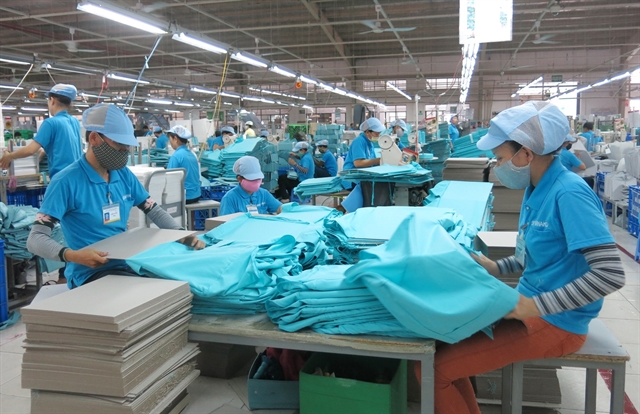[ad_1]

HÀ NỘI – The Ministry of Finance (MoF) will support businesses when implementing the socio-economic recovery and development programme, Finance Minister Hồ Đức Phớc said.
Specific areas will include accessing markets, capital, labour and infrastructure as well as open administrative procedures.
MoF will accompany firms with supportive solutions so that the domestic business community can overcome difficulties to restore and develop production. Thereby they can contribute to the economic recovery and development.
Minister Hồ Đức Phớc was addressing a forum on “Fiscal policy to support the socio-economic recovery and development programme” that was held on Thursday in Hà Nội by the Thời báo Tài chính (Vietnam Financial Times) and the Đầu tư (Investor) Magazine.
The ministry has listened to opinions from the businesses and then reported to authorities to remove obstacles to business development. At the same time, it also promulgates policies to achieve financial development goals, ensure strong and harmonious economic development, and improve national competitiveness, according to Phớc.
Đặng Ngọc Minh, deputy director of the General Department of Taxation, said the general department had built drafts of two decrees on extending the deadline for tax and land rent payments. They included the decree on extending payment of value added tax, corporate income tax, personal income tax, and land and water surface rent in 2022 and the decree extending the deadline for excise tax payment for domestically manufactured or assembled cars.
For these two drafts, the General Department of Taxation had collected opinions from ministries, agencies, and people’s committees of provinces and cities. At the same time, it also had coordinated with the Việt Nam Federation of Commerce and Industry to organise an online seminar on those drafts.
The ministry was finalising the drafts to send to the Ministry of Justice for appraisal before submitting them to the Government for consideration of issuance in April 2022.
If they were approved, the total amount of tax, land rent and water surface rent extended payment would reach about VND132 trillion to VND137 trillion, said Minh.
The extension would be of great significance to businesses and individuals because they could have more financial resources for production, promoting economic growth, said Minh.
Meanwhile, the customs sector has also continuously implemented reforms to create more favourable conditions for businesses. Hoàng Việt Cường, deputy director of the General Department of Customs, said that the General Department of Customs had proactively implemented solutions to create favourable conditions for trade activities, helping businesses and people in recovery and development of production, imports and exports.
Last year, it completed regulations to shorten customs clearance time and reduce costs for enterprises.
By reviewing, amending and supplementing core documents in customs procedures and guiding circulars, the General Department of Customs had proposed to reduce documents, orders and procedures that are not necessary to simplify administrative procedures and handle problems.
In addition, the general department had strengthened research for modernising equipment to support customs inspection and supervision, and carried out specialised inspections for imported and exported goods.
It had also promoted simplification and automation of customs procedures, and implementation of the national single window, ASEAN single window and the application of information technology for online public services.
In the future, Việt Nam would continue to promote administrative reform in an extensive and comprehensive manner to reduce the time for customs clearance of goods, creating favourable conditions for businesses, and meeting the requirements of State management.
I would focus on reviewing and evaluating the implementation of the Law on Customs; redesigning the information technology system of the customs sector based on the latest technology.
It would also promote electronic document exchange via the ASEAN Single Window; review the implementation of administrative procedures via the National Single Window; and reform specialised inspections.
Especially, the customs sector would coordinate with ministries, sectors and businesses to reform customs clearance procedures for import and export goods, creating favourable conditions for the businesses to cut costs and save time, and improve national competitiveness, Cường said. VNS
[ad_2]
Source link
